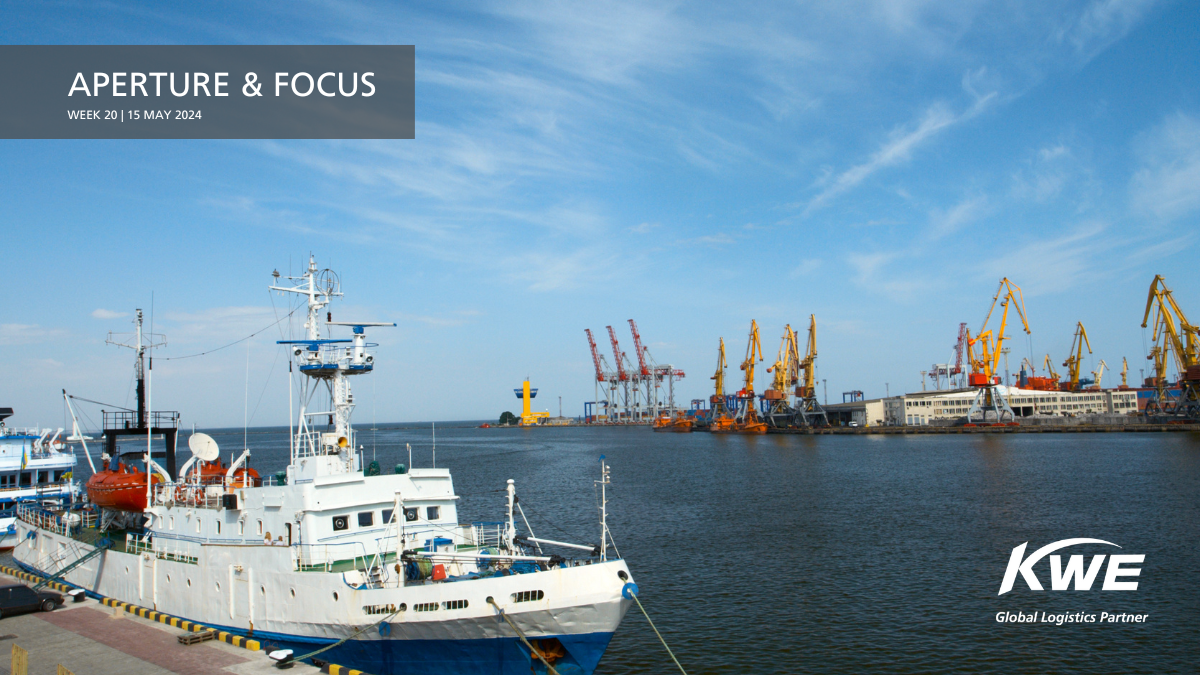Quote
Aperture & Focus 2024: Week 20

Global Aperture
According to recent analysis, the Red Sea crisis has prompted a substantial reduction in shipping capacity, notably affecting Asia-Mediterranean traffic. This has led to heightened congestion and extended wait times at transshipment ports, compounding challenges for carriers and freight forwarders.
Newly introduced U.S. tariffs on Chinese imports may disrupt global supply chains and increase costs for US consumers, according to new analysis, potentially leading to a shift in supply chain routes. However, this could introduce complexities and increased costs amid existing challenges in the ocean freight container shipping market.
Regional Focus
Americas
United States: The International Longshoremen’s Association (ILA) and United States Maritime Alliance (USMX) have jointly expressed confidence in reaching a new contract agreement before the current one expires on September 30, 2024, as they proceed with local negotiations before moving on to the master contract talks. The contract will cover around 45,000 dockworkers along the US East and Gulf Coasts.
Canada: In Canada, the Teamsters Canada Rail Conference (TCRC) encountered frustration when the Minister of Labour intervened to prevent an impending strike set for May 22nd due to public safety concerns. Despite the strike's postponement, negotiations between the union and rail operators Canadian National Railway (CN) and Canadian Pacific Kansas City (CPKC) are set to continue as planned.
The Port of Halifax has received the first four of eight electric Rubber-Tyred Gantry cranes (E-RTG) at PSA Halifax’s Atlantic Hub, signaling a move towards sustainability and productivity. These cranes are set to increase yard handling capacity by around 25% and cut CO2 emissions by 1.5 kilotonnes annually per E-RTG.
Asia-Pacific
Sri Lanka: The Port of Colombo is experiencing terminal capacity pressure due to increased transshipment activity from the Red Sea, leading to a spill-over effect impacting other ports such as the Ennore Container Terminal (AECTPL) near Chennai. This surge in ad-hoc vessel calls has disrupted terminal operations and resulted in delays in vessel berthing.
India: Since April 12th, negotiations between striking employees and Gangavaram port authorities have remained inconclusive, prolonging the strike. Protesters' actions have halted movement of manpower and materials, including critical raw material supplies to power and steel units, resulting in a month-long deadlock and slashing production capacity by 60% due to disrupted coal transfers and stalled supply chains.
Europe, Middle East & Africa
Recent data suggests that concerns about congestion in the western Mediterranean ports may have eased, yet the persistent issues in the Red Sea could soon stretch regional port capacities to their limits. Reports from Xeneta and the eeSea liner database reveal sharp rises in transshipment volumes, with ports such as Barcelona and Valencia approaching full capacity, potentially leading to significant operational challenges if these trends persist.
The European 'EfficientFlow' project has facilitated the implementation of port collaboration solutions in Baltic Sea ports, reducing waiting times, fuel consumption, and carbon emissions. The Port Activity App™, a product of the project, enables real-time coordination for approaching cargo ships, benefiting all actors in the port, and promoting sustainability.
Germany: The Port of Hamburg has become the first in Europe to offer shore power for both container ships and cruise vessels. This initiative, backed by a $14 million investment over two years, aims to reduce CO2 and pollutant emissions, with plans to equip all large cruise and container terminals with shore power connections by 2025.